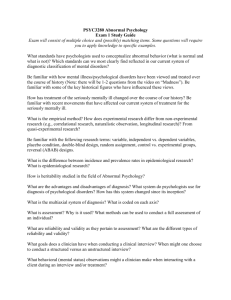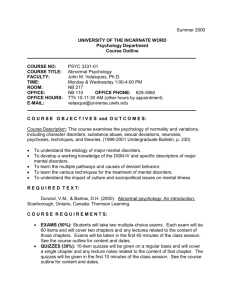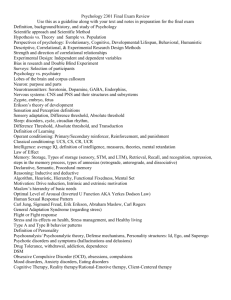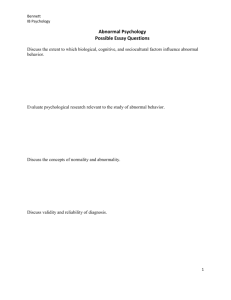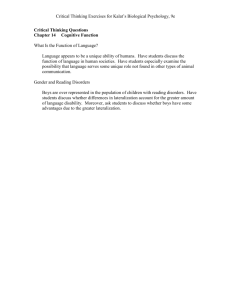PSY 309 Anormal Psychology
advertisement
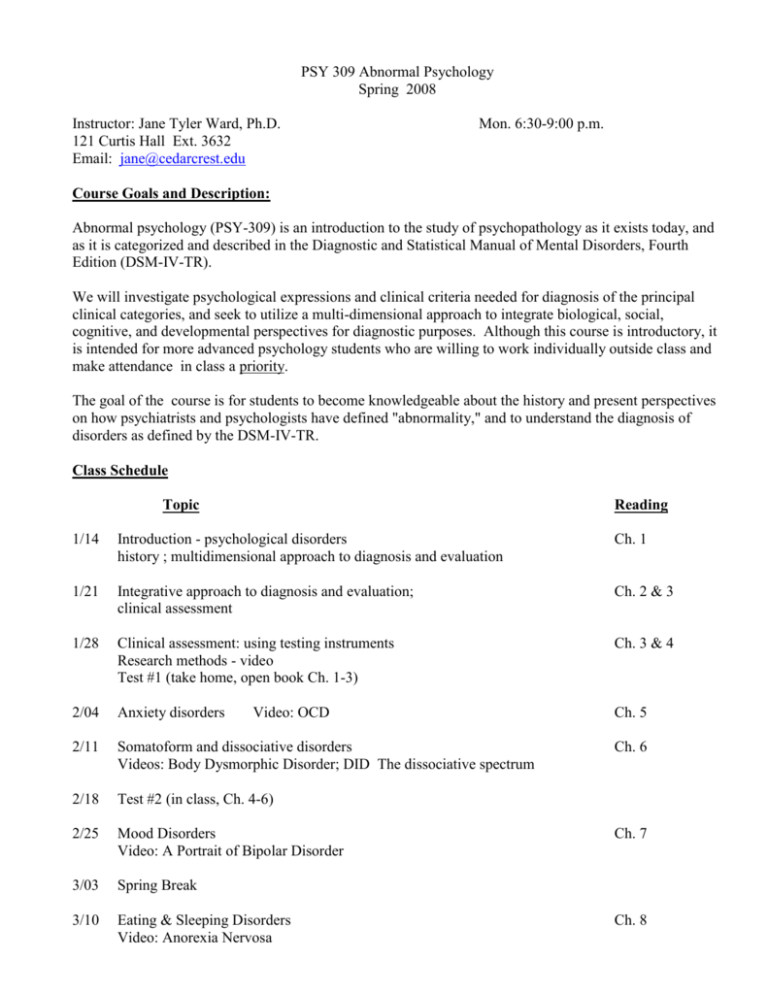
PSY 309 Abnormal Psychology Spring 2008 Instructor: Jane Tyler Ward, Ph.D. 121 Curtis Hall Ext. 3632 Email: jane@cedarcrest.edu Mon. 6:30-9:00 p.m. Course Goals and Description: Abnormal psychology (PSY-309) is an introduction to the study of psychopathology as it exists today, and as it is categorized and described in the Diagnostic and Statistical Manual of Mental Disorders, Fourth Edition (DSM-IV-TR). We will investigate psychological expressions and clinical criteria needed for diagnosis of the principal clinical categories, and seek to utilize a multi-dimensional approach to integrate biological, social, cognitive, and developmental perspectives for diagnostic purposes. Although this course is introductory, it is intended for more advanced psychology students who are willing to work individually outside class and make attendance in class a priority. The goal of the course is for students to become knowledgeable about the history and present perspectives on how psychiatrists and psychologists have defined "abnormality," and to understand the diagnosis of disorders as defined by the DSM-IV-TR. Class Schedule Topic Reading 1/14 Introduction - psychological disorders history ; multidimensional approach to diagnosis and evaluation Ch. 1 1/21 Integrative approach to diagnosis and evaluation; clinical assessment Ch. 2 & 3 1/28 Clinical assessment: using testing instruments Research methods - video Test #1 (take home, open book Ch. 1-3) Ch. 3 & 4 2/04 Anxiety disorders Ch. 5 2/11 Somatoform and dissociative disorders Videos: Body Dysmorphic Disorder; DID The dissociative spectrum 2/18 Test #2 (in class, Ch. 4-6) 2/25 Mood Disorders Video: A Portrait of Bipolar Disorder 3/03 Spring Break 3/10 Eating & Sleeping Disorders Video: Anorexia Nervosa Video: OCD Ch. 6 Ch. 7 Ch. 8 3/17 Personality Disorders Video: Antisocial Personality Disorder Exam #3 Take Home Ch. 12 3/24 Break 3/31 Video and video reaction paper “Girl Interrupted” 4/07 Schizophrenia & other psychotic Disorders Video: Schizophrenia Video reaction paper due Ch. 13 4/14 Developmental Disorders Ch. 14 Handout 4/21 Cognitive Disorders Ch. 15 4/28 Final Exam (primarily last 3 chapters & clinical diagnoses) Requirements 1. Attendance and video reaction paper: 15% 2. The Psychology Department is committed to the principle that regular and punctual class attendance is essential to the students’ optimum learning and successful academic achievement. Regular class attendance is a student obligation, and students are responsible for all the work, tests and written assignments. Therefore, students are expected to be present for all class sessions. Attendance Policy: Formal attendance will be taken during all class sessions, and this course will adhere to the Psychology Department Attendance Policy. This class meets once a week. You may miss 2 classes without penalty. If you miss 3 classes, your grade will be lowered by one full letter grade. If you miss 4 classes, you will receive a failing grade for the course. There are no exceptions. Participation is required. If you have problems asking or answering questions in class, please see me and we can discuss how you can demonstrate participation in this class. The video reaction paper is included in the participation grade. 2. Four exams: 2 in class and 2 take home (open book): 85% All exams include a case-study portion. The final exam has an interactive case study. 3. This is an eCompanion course, and as such you will need to access slides on the eCompanion site for this class. Detailed instructions for using eCompanion are posted on the Current Students link of the Cedar Crest College website. If you have never used eCompanion before, you are strongly encouraged to read and follow these instructions. If you are unable to access these instructions, please ask me and I will make them available for you. Honor Code and Classroom Protocol You will be expected to abide by the College Honor Code in all papers and examinations. Confirmed violations of the Code are incompatible with the goals of the Psychology Department, and therefore, will result in a failing grade for the course. Equally important are the standards for classroom behavior, stated in the Classroom Protocol. Such behavior respects the right of students and faculty to a courteous, respectful classroom environment that promotes learning. Late arrivals, early departures, disruptive conversations and note-passing are examples of distractions that might compromise students' access to the best possible learning environment. Please note that the guiding principle is mutual respect and common acknowledgement of the fact that students in this course are engaged in a serious academic endeavor. Grading: A AB+ B BC+ 93.0-100% 90.0-92.9% 86.7-89.9% 83.4-86.6% 80.0-83.3% 76.7-79.9% C CD+ D F 73.0-76.6% 70.0-72.9% 67.0-69.9% 66.9-60% below 60% Required Text: Barlow, D. and Durand, V. (2005). Abnormal Psychology. (4th Ed.) New York: Thompson-Wadsworth Course Objectives: The student will: 1. Understand the abnormal psychology nosology and apply knowledge of abnormal psychology to everyday life. 2. Understand and apply the diagnostic categories of the DSM-IV-TR. Student Assessment: 1. To assess #1 above, there will be four multiple choice tests. 2. To assess #2 above, the student will analyze case studies, two characters from a film and one interactive role play.
